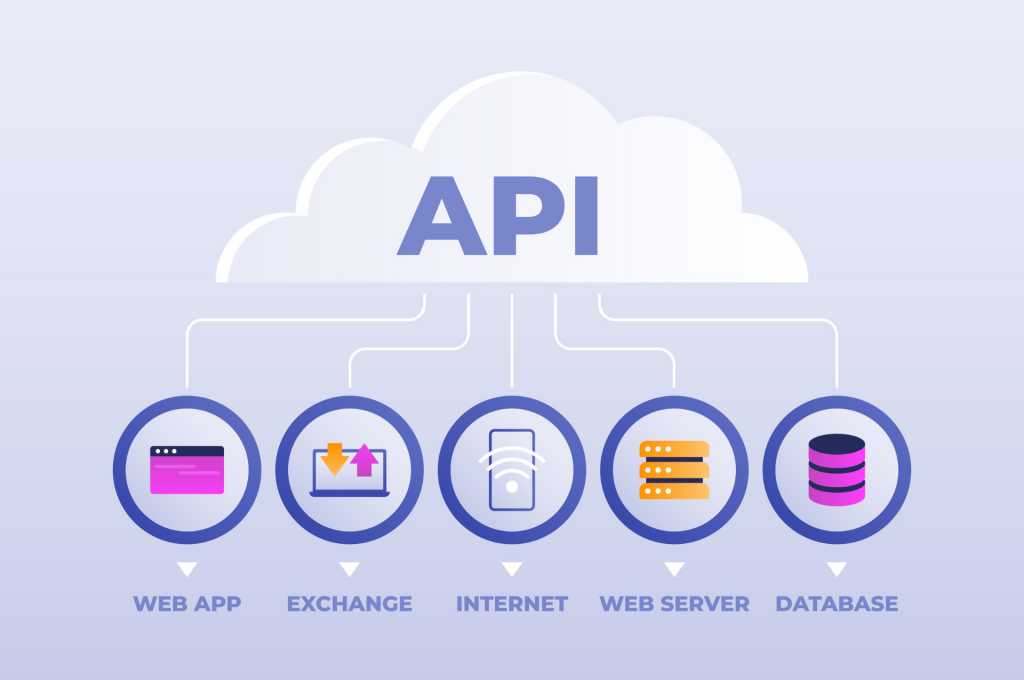Boost Your eCommerce: 12 Key API Integrations for Online Success
APIs, or Application Programming Interfaces, are essential tools for eCommerce websites that allow different software systems to communicate and work together.
They are like interpreters or messengers, sending requests and returning responses between applications. This communication enables functionalities we often take for granted in our online experiences.
In eCommerce businesses, APIs are crucial for creating a seamless shopping experience and integral for a frictionless checkout process. They integrate various functionalities like payment processing, inventory, and customer relationship management (CRM) into an online store.
For instance, when you check out from an online shop, a Checkout API processes your payment by connecting to a payment gateway, ensuring a secure and swift transaction.
The Power of Connection
Imagine a customer placing an order on your site. Without eCommerce API integration, you’d manually need to update inventory, process payment, and arrange for shipping processes – a time-consuming and error-prone process. APIs automate these business processes, ensuring a smooth, error-free operation.
They save time and provide a more accurate, real-time view of your business operations.
API integration in eCommerce is like the glue that holds the diverse elements of your online store together.
Whether it’s syncing your inventory with a warehouse management system, processing payments through secure gateways, or automating shipping and tracking – integrating various software applications makes it all possible.

It’s the behind-the-scenes maestro conducting the seamless symphony of your online store’s operations.
The importance of APIs in E-commerce
- Efficiency: APIs automate and streamline processes, making online interactions faster and more efficient. It offers important functionalities, such as sophisticated payment processing, real-time shipping calculations, and integration with a CRM system.
- Flexibility: They allow for integrating various features and services, like connecting to online merchants, linking social media platforms, or adding chat support to a website.
- Enhanced User Experience: APIs provide a smoother user experience by enabling real-time updates and interactions. It offers features like personalized recommendations, streamlined checkout processes, and integrated customer support systems that can require API integration.
- Automation: They automate processes, such as order processing, inventory synchronization across multiple channels, or automatic customer data updates.
Exploring Popular E-Commerce APIs
Online store integrations are the building blocks that empower your platform with diverse functionalities. These key systems come in various types, each designed to cater to different aspects of the shopping experience.

Understanding these types is crucial for any business owner looking to enhance their operations and customer service.
1. Payment API
- Stripe API: Known for its flexibility, Stripe enables businesses to customize payment processes. It supports international payments, debit cards, and various currencies, making it suitable for global e-commerce operations.
- PayPal API: Offers a secure and user-friendly payment solution. It’s widely recognized, which can increase customer trust during checkout. The API also facilitates subscription-based services and recurring payments.
2. Logistic and Shipping API
- Shippo API: Provides a unified platform for all shipping needs. Its cost-effective pricing model is particularly beneficial for small to medium-sized businesses. Shippo offers discounted rates for carriers and simplifies returns.
- EasyPost API: Supports over 100 carriers, giving businesses the flexibility to choose the most suitable and economical shipping provider options through their web platforms or mobile applications. It also offers tracking services for all shipments, which can be seamlessly integrated into a mobile application, enhancing customer satisfaction by providing real-time updates on the go.
3. The Customer Relationship Management (CRM) APIs
- Salesforce API: Integrates with e-commerce platforms to centralize customer data, sales, and analytics. It’s powerful for segmenting customers and creating targeted marketing campaigns.
- HubSpot API: Excellent for inbound marketing, this API helps generate leads, manage business logic in sales funnels, and automate email campaigns, directly impacting sales and customer engagement.
4. The Inventory Management APIs
- Shopify API: Beyond inventory management, this API allows the creation of custom storefronts and integration with third-party marketplaces, expanding the reach of your business.
- Magento API: Ideal for handling large-scale e-commerce operations, offering extensive customization options, and the ability to handle complex product catalogs and multiple store views.
5. The Product Information and Review APIs
- Google Shopping API: This API not only showcases products on Google Shopping but also helps optimize product listings for better visibility and reach.
- Yotpo API: Facilitates collecting and displaying customer reviews and photos, which can significantly boost conversion rates. Yotpo also offers insights into customer sentiment and feedback.
Each type of eCommerce API offers unique capabilities that can significantly enhance your online store’s functionality and customer satisfaction. By integrating these APIs, you can automate processes, provide better service, offer personalized experiences, and gain valuable insights into your business operations.
Exploring Advanced API Integrations
The landscape of eCommerce operations is continuously evolving, demanding more sophisticated and efficient tools for success. Key among these are specialized APIs – Sales Tax, Catalog, Cart, and Multicurrency – each playing a vital role in enhancing the online shopping experience.

6. Sales Tax API
These APIs are a game-changer for compliance and accuracy in tax management. They adapt to different tax jurisdictions, thus minimizing the risk of tax-related errors and ensuring legal compliance in different markets
- What It Does: Automates the calculation of sales taxes for each transaction by considering product types, customer locations, and updated tax laws.
- Resources: Developers can find Sales Tax API implementation tools on platforms like Avalara, TaxJar, or official government tax websites. These platforms often provide extensive documentation, SDKs, and community support.
7. Catalog API
The heart of any eCommerce site is its product catalog. These APIs keep this heart beating with dynamic, updated content, significantly enhancing customer browsing experiences and aiding in informed purchasing decisions.
- What It Does: Efficiently manages product listings, including comprehensive details like descriptions, high-quality images, pricing, and categorization.
- Resources: It can be found in eCommerce platform documentation like Magento, Shopify, or BigCommerce. These platforms provide detailed API docs, user guides, and active developer forums.
8. Cart API
A robust Cart API is crucial for a frictionless shopping experience. It is pivotal in reducing cart abandonment by ensuring a smooth, error-free process from selection to checkout, thereby increasing conversion rates.
- What It Does: Manages the functionalities of the shopping cart, including additions, deletions, quantity adjustments, and running totals.
- Resources: Developers can refer to eCommerce platform documentation such as WooCommerce or Shopify for Cart API resources. These include comprehensive API guides, SDKs, and community forums for support and best practices.
9. Multicurrency API
In today’s global marketplace, a Multicurrency API is indispensable. It offers customers the convenience of viewing prices and making payments in their local currency, which is a key factor in boosting international customer engagement and satisfaction.
- What It Does: Facilitates displaying prices and processing transactions in various global currencies.
- Resources: It can be accessed through financial service providers like Stripe or PayPal and eCommerce platforms that offer multicurrency support. They provide detailed documentation, SDKs, and API references.
10. Login API Tools
The Login API is essential for maintaining secure user access and data protection. It adapts to various security protocols and regulations, minimizing data breaches and unauthorized access risks.
- What It Does: Automates user authentication and authorization processes, ensuring secure login experiences while complying with data privacy laws.
- Resources: Developers can utilize resources from OAuth providers and identity management services like Auth0 or Firebase Authentication. These resources include in-depth guides, SDKs, and community support.
11. Amazon API Tools
Amazon API is pivotal for integrating with the Amazon marketplace, enhancing product visibility and sales efficiency.
- What It Does: Facilitates product listings, order management, and access to Amazon’s vast customer base, streamlining eCommerce operations on one of the world’s largest online platforms.
- Resources: Amazon provides extensive resources for its API through the Amazon Developer portal. This includes SDKs, Amazon MWS documentation, and access to a community of Amazon API developers.
12. REST API Tools
The REST API is invaluable for integrating disparate systems and ensuring harmony between various software components.
- What It Does: Provides a set of guidelines for creating APIs that allow for reliable and efficient communication between different software systems.
- Resources: It can be found in web development frameworks like Django, Flask, or Express.js documentation. Additionally, API testing tools like Postman and Swagger offer valuable resources for developing and testing RESTful APIs.
Integrating Top APIs with Leading ECommerce Platforms
The right eCommerce business platform paired with effective API integrations can significantly elevate your online business.
Whether you prioritize ease of use, customization, or all-in-one solutions, platforms like Shopify, Magento, WooCommerce, and BigCommerce offer compatibility with query tools that analyze customer behavior, making your online store more efficient and user-friendly and also offer diverse options to integrate with essential services like Stripe, PayPal, Shippo, and Salesforce.
Step-by-Step Guide on Implementing API Integration
Integrating an Application Programming Interface (API) into your e-commerce store can seem daunting, but it’s a crucial step in enhancing your site’s functionality and customer experience. Here’s a step-by-step guide to help you through the process:

1. Identify Your Integration Needs:
Before diving in, it’s crucial to identify what you want to achieve with API integration. Do you want to enhance customer experience, streamline operations, or expand your product range? Knowing your goals will help you choose the right APIs for your business.
Research Applicable APIs: Look for APIs that align with your specific needs. Consider factors like compatibility with your e-commerce platform, cost, and support.
2. Choose the Right E-commerce Platform
Compatibility Check: Ensure your e-commerce platform can support the APIs you plan to integrate. Platforms like Shopify, Magento, WooCommerce, and BigCommerce are known for their API-friendly nature.
Platform Capabilities: Understand the limitations and capabilities of your platform regarding API integration.
3. Read API Documentation Thoroughly
Understanding the API: Before starting the integration, read the API documentation provided by the service. This will give you an insight into how the API works and its integration requirements.
Technical Requirements: API documentation usually includes technical guidelines, sample code, and best practices.
Understanding it thoroughly will help you (or your development team) anticipate potential challenges and how to address them.
Pay special attention to rate limits, data formats, authentication methods, and error-handling procedures. Well-documented APIs often result in smoother integration and fewer headaches down the line.
4. Plan for Secure Integration
Security Protocols: Ensure the API provides secure data transmission, especially for payment and customer data. Look for SSL/TLS encryption and compliance with data protection regulations.
Data Privacy: Be mindful of data privacy laws and ensure compliance.
5. Testing Before Going Live
Before going live, rigorously test the APIs in a controlled environment. Ensure they work as expected and are in sync with other parts of your eCommerce ecosystem. This step is vital to prevent any hiccups when you go live.
Sandbox Environment: Many APIs offer a sandbox environment for testing. Use this to test the integration without affecting your live store.
6. Roll Out and Monitor
Go Live: Implement the API on your live store once testing is successful.
After integration, continuously monitor the performance of your APIs. Look out for any issues that might affect user experience or operations. Use analytics to understand how the integration impacts your business and optimize accordingly.
Properly integrated APIs can enhance your e-commerce site’s functionality, leading to a better user experience, a key factor in SEO. Improved site performance and customer satisfaction can positively influence your search engine rankings.
What’s Next for eCommerce APIs?
The future of eCommerce APIs is not just about technological advancements; it’s about creating a more connected, secure, and personalized shopping experience. By staying abreast of these trends, businesses can ensure they are not just keeping pace but leading the way in the digital marketplace.

1. Increasing Adoption of AI and Machine Learning: Imagine an API that recommends products and anticipates customer needs based on shopping behavior and trends.
From personalized shopping experiences to predictive analytics in inventory management, Artificial Intelligence and machine learning technologies are set to transform customer interactions into tailored experiences.
2. Enhanced Focus on Security and Privacy: As eCommerce transactions continue to grow, so does the need for robust security protocols. Future APIs will likely integrate advanced security features like end-to-end encryption and multi-factor authentication, ensuring customer data remains safe and secure.
3. Blockchain Technology: A Game-Changer for Transparency: Blockchain could revolutionize eCommerce APIs by introducing unparalleled transaction transparency and security. This technology simplifies and secures processes like supply chain tracking and warranty management, building trust and efficiency in customer interactions.
4. Seamless Omnichannel Experiences: The future of eCommerce lies in seamless experience integration across multiple channels. APIs will play a critical role in unifying these channels, providing a consistent and fluid customer experience whether online, via mobile, or in-store.
5. Voice and AR/VR Integration: Integrating voice commands and augmented/virtual reality (AR/VR) into eCommerce APIs is on the horizon. This will enhance the shopping experience and open new product interaction and customer engagement avenues.
6. Sustainability and Ethical Practices: As consumers become more environmentally conscious, eCommerce APIs will start incorporating features that promote sustainability. This includes tracking the carbon footprint of products and offering eco-friendly alternatives.
The Power of eCommerce API Integration for Business Success
Embracing eCommerce API integration is essential in today’s digital marketplace. It streamlines operations, enhances customer experiences, and provides valuable insights for informed decision-making.
Embracing these technological advancements is more than an upgrade—it’s a transformative shift towards a smarter, more responsive, and customer-centric business model, positioning companies at the forefront of innovation and market leadership.
Empower your eCommerce journey with our specialized development team. We’re here to integrate the finest APIs seamlessly, elevating your platform to unparalleled heights.

